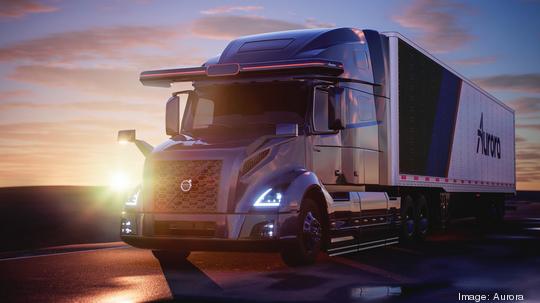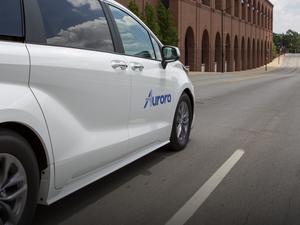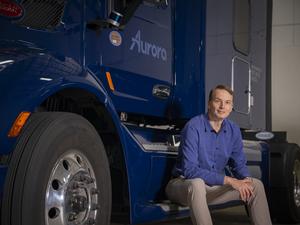
Fresh off the news of its expected IPO date, autonomous vehicle startup Aurora Innovation Inc. is showing no signs of slowing down as it races to convince future customers that its products are ready for commercialization in time for its November public listing debut.
As part of that pitch, the Pittsburgh-based company released new details on its planned subscription services that are aimed at customers with vehicle carriers, fleets and networks which are looking to replace human-driven cars, trucks or vans with those driven by the Aurora Driver — Aurora's name for its fully autonomous self-driving software and hardware capabilities as well as the data services that come with it.
The company said the subscription services will be available under two different names; Aurora Horizon for goods delivery and Aurora Connect for ride-hailing.
With Aurora Horizon, the company is targeting carriers and private fleets that deliver goods, be it the trucking industry that traverses hundreds of miles of highway per trip to last-mile delivery vans that operate in rural and urban environments alike. The company said the suite of tools it will offer with this subscription model will allow customers to integrate the services into existing operations, which it's essentially already doing with its collaboration between FedEx Corp. and Washington-based truck manufacturer Paccar, a partnership Aurora announced in September.
As for Aurora Connect, the AV company is looking to attract customers that operate ride-hailing fleets, like Uber Technologies Inc., to transport people wherever it is that they'd like to go but with vehicles that drive themselves. The company said its goal is to provide fleet operators with a predictable supply of Aurora-powered vehicles capable of responding to fluctuating demand from humans in need of a ride.
Aurora declined to provide specific pricing details of these subscription services when asked but said that its predictable pricing model "will reduce operational costs for customers, like carriers and private fleets." The company also declined to provide annual revenue figures, though it said that it "anticipates beginning to generate revenue from trucks without vehicle operators in late 2023," and noted that it will maintain and operate a fleet of 20 of its own trucks.
"The Aurora Driver is set up to be delivered as a service and monetized on a usage basis," Aurora said in an email statement to Pittsburgh Inno. "We believe a driver-as-a-service business model allows for focused development, rapid scaling through partnerships, and high-margin revenue."
According to its investor deck, Aurora believes the U.S. trucking industry is at $700 billion in market revenue and it puts the local goods delivery and ride-hailing industries at $100 billion and $35 billion in market revenue, respectively. It's hoping to tap into all three with its Aurora Driver technology via these subscription offerings.
"As we prepare to launch our first commercial products, we’ve designed simple, application-specific product suites to integrate seamlessly within our customers’ businesses and empower their operations," Aurora said in a blog post. "Introducing our product suite is an important step to enabling carriers, private fleets, and ride-hailing networks to operate Aurora-powered trucks and cars."
Aurora employs the majority of its 1,600-person workforce out of Pittsburgh, though it maintains operations elsewhere around the country including the Bay Area of California and in Texas. It's now expecting to list on the Nasdaq stock exchange on Nov. 4 if shareholders approve of its merger with Reinvent Technology Partners Y (RTPY), a special purpose acquisition company (SPAC) led by LinkedIn co-founder Reid Hoffman and Zynga founder Mark Pincus.









